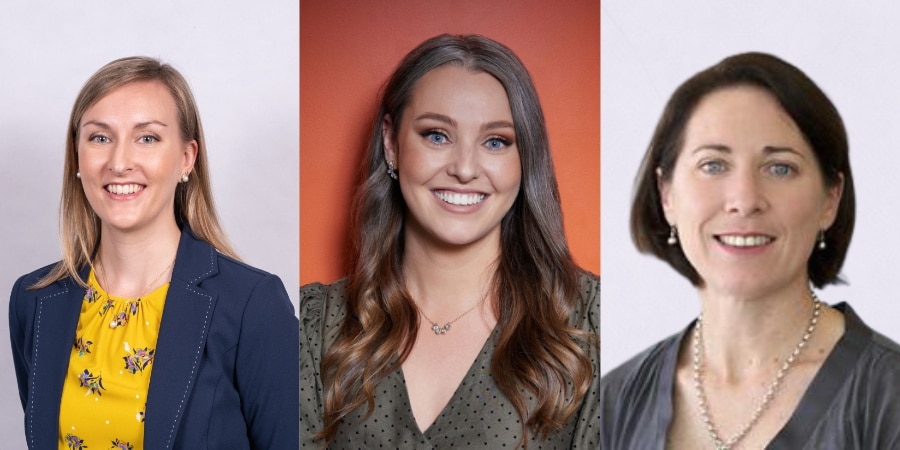
Cerebral Palsy Alliance researchers awarded funding from Federal Government’s Medical Research Future Fund
A pair of emerging research leaders from Cerebral Palsy Alliance are part of multidisciplinary collaborative projects awarded vital research funding by the Federal Government’s Medical Research Future Fund (MRFF).
Dr Madison Paton, an expert on stem cells, and Dr Sarah Reedman, whose area of expertise is cerebral palsy and physical activity, have both been successful in receiving Early to Mid-Career Research (EMCR) grants in the latest round of MRFF funding.
Dr Paton is a Chief Investigator on a four-year, $590,134 project to establish a world-first treatment for newborn brain injury in vulnerable preterm babies using stem cells grown from umbilical cord blood (UCB).
The project will be led by Hudson Institute of Medical Research’s Dr Courtney McDonald, a stem cell biologist and previous CPA Early Career Fellowship recipient, alongside a multidisciplinary team of researchers from Monash University, Monash Health and the University of Sydney. The team also includes CPA’s head of Victorian research, Professor Rod Hunt and partners from Cell Care Australia, Hudson Institute of Medical Research and Monash University.
Stem cells to treat brain injuries in vulnerable newborns
Studies have shown that UCB is safe and effective for the treatment of children with cerebral palsy and newer research is now focussing on treating newborns. However, the majority of babies born extremely preterm have an insufficient amount of their own UCB for treatment.
The pre-clinical study will find solutions to this challenge by ‘expanding’ UCBs, a technique that increases the number of cells using lab techniques and therefore enables a higher dose of stem cells to be administered. Expanded UCBs are a well-established method to treat haematological conditions and blood cancers, but this study will be the first to optimise this technology in the lab and understand if it is a potential treatment for brain injury.
Importantly, the project will closely involve people with cerebral palsy and their families to help inform what researchers are doing in the lab. As well as her scientific expertise, Dr Paton will engage the CP community through CPA’s Stem Cell Reference Group to provide meaningful discussion and advice on the research as it progresses towards clinical trial.
“Understanding what our community wants and better informing what researchers do in the lab is so important. We are creating meaningful research and it’s a joy to see this grant come to life. I am so lucky to play a small role in a big collaboration,” said Dr Paton.
Frame running for improved health and wellbeing
Dr Sarah Reedman, an Implementation Fellow at CPA, has also been awarded $768,886 over two years to conduct a randomised trial to test whether frame running improves health outcomes. Frame running is an adaptive sport using modified three-wheeled frames that allow people with cerebral palsy increased mobility.
People with CP have reduced mobility and therefore poor heart and lung health. Pilot programs of the benefits of frame running has shown that the sport increases fitness, muscle volume and social outcomes, and Dr Reedman’s ‘Run4Health’ study will recruit 90 participants between the ages of eight and 21 to test if it also leads to better health outcomes and quality of life.
Dr Reedman’s project is led by the Queensland Cerebral Palsy and Rehabilitation Research Centre at The University of Queensland Child Health Research Centre, with involvement from The University of Sydney’s Charles Perkins Centre and Curtin University.
Tailored intervention for young adults
A third CPA researcher, Senior Research Fellow Dr Hayley Smithers-Sheedy, is closely involved with Transition Compass, which has received $4.7m from MRFF to conduct a randomised control trial to determine the effectiveness of a tailored transition intervention from paediatric care to adult health services for young adults with chronic medical conditions.
Led by University of NSW’s Dr Jordan McLoone and a team of collaborators, the project will involve sites across NSW, South Australia and Victoria.
“Congratulations to Madison, Sarah and Hayley and all our CPA researchers who have been awarded funding from the MRFF. These exciting projects will lead to real, impactful improvements for people with disability, and we are excited to see this research come to life,” said Rob White, CEO of Cerebral Palsy Alliance.
The MRFF Early to Mid-Career Research grant is among the most competitive scientific funding in Australia, with less than 6% of 418 eligible applicants successfully receiving grants in the most recently-announced MRFF round.